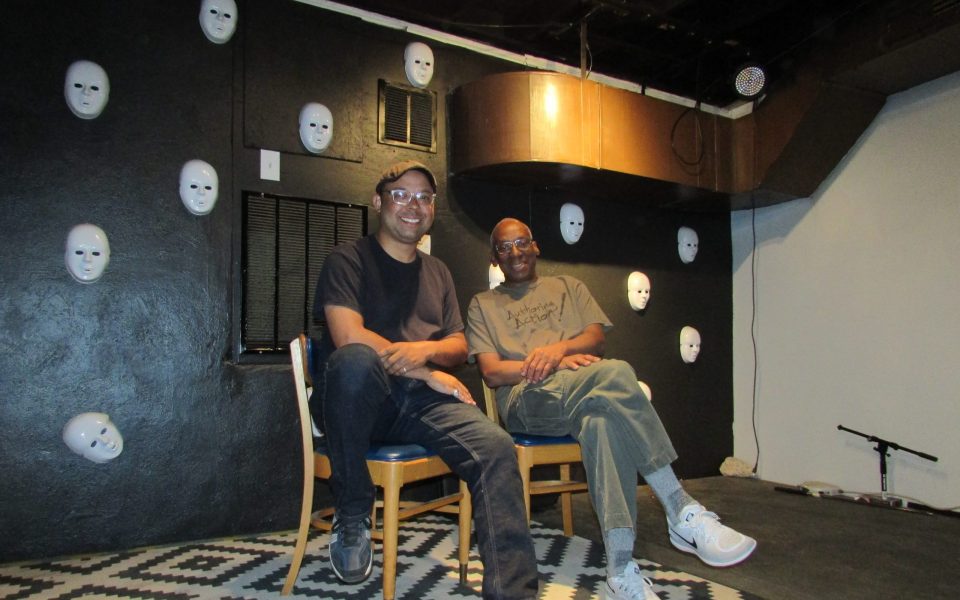Nina Simone’s monumental legacy as an iconic singer, civil rights activist and virtuoso pianist has continued to unfold since her death in France in 2003, with her work repurposed in hip-hop samples, exploited in a Ford commercial, dissected in academic papers, examined in a recent documentary and continuously embraced by new generations of fans.
Nathan Ross Freeman and Cheyenne Covington, respectively the director and producer of the play Little Girl Blue, knew they had to take a unique approach to pull off a dramatic exploration of such a complicated subject. Freeman, who is also the writer, came up with the idea of building the play around a conversation between Nina Simone, the established artist, and Eunice Waymon, the girl prodigy (Waymon was her given name, and she adopted Simone when she became a performer).
Sitting with Covington at the bar at Monstercade in Winston-Salem’s Washington Park neighborhood before it opened for service on a recent Friday afternoon, Freeman mused that Simone was unique in that her dreams were deferred by success as opposed to failure. The young Eunice Waymon trained to be a classical pianist with the support of her family and the entire community where she grew up in Tryon, NC. Her family relocated to Philadelphia where she hoped to be accepted into the Curtis Institute. When she was rejected — likely because of her race — she had to go to work in nightclubs to support the family. The rejection resulted in two tectonic shifts: She had to sing, and was forced to adapt her repertoire to popular tastes for show tunes and pop standards in the 1950s. Despite achieving commercial success as a singer, her goal to be a classical pianist was permanently derailed.
“There’s a universal aspect to the play,” Freeman said. “We all have a conversation with our younger self — everyone has at least one a day — asking: Is our younger self going to be for it or against it? Every decision you make is leveraged against your younger self when you were guided through a right upbringing.”
Markeisha Ensley is cast as Nina, while Bijan Miarra plays Eunice. Freeman wanted to avoid creating a tribute or committing exploitation — the play completely bypasses Simone’s well-documented mental illness. Instead, it’s set up as a conversation, with one passage showcasing a debate in song by interspersing “Sinnerman” and “Everything Must Change,” with Nina and Eunice singing both songs.
“I created a playlist — a collection of songs that would deal with love, memoir, protest, self, and, to a certain extent, the afterlife,” Freeman said.
“She had red lines,” he continued. “Once she crossed, she never went back, although she lamented.”
The first encounter with Simone’s music can be a life-changing experience. Freeman was a 19-year-old participating in a summer project to protest gentrification in Harlem in 1969 when a fellow volunteer pulled out one of Simone’s albums and played “Four Women.”
“All of a sudden I would look out the window and everything was different,” Freeman recalled. “I have the same experience every time I hear it. If I heard it now, this room would look different.”
Covington, the play’s producer, underwent a similar epiphany when he first heard Simone’s music around 2000. Covington’s first production, High Priestess, featured jazz-soul singer Melva Houston interpreting Simone’s material. It was staged at PS 211, the performance space that would evolve into Krankies. From that point, Covington dreamed of doing something more ambitious, and he talked to Freeman about what the project would look like.
“Two years ago, I thought I wanted to put major money behind it and do it right,” Covington said. “I wanted Nathan, and I presented him with an offer he couldn’t refuse.”
The conceptual development of Little Girl Blue coincided with one of the lowest and most difficult periods of Covington’s life. Around 2005 he came down with Crohn’s disease, a chronic inflammation of the bowels, and almost died. Throughout his recuperation, Simone’s music was an almost constant companion.
“I suffered a lot, and through that learned that if you want it bad enough you’ll do whatever you have to, to get it,” Covington said.
As a testament to Covington’s vision, Little Girl Blue attracted the support of two stalwarts of the National Black Theatre Festival. Freeman first came to Winston-Salem in 1985 to stage his play The Contract at the invitation of Larry Leon Hamlin, the festival founder. Hamlin wound up keeping Freeman on as the first resident playwright of the NC Black Repertory Co. And Mabel Robinson, who recently retired as artistic director for the NC Black Repertory Co., agreed to serve as dramaturge for Little Girl Blue.
“Mabel sets the tone; she’s our metronome,” Covington said. “What she says is golden. Nathan is the director, but she’ll point it out if she senses something is off.”
Covington and Freeman developed Little Girl Blue with the hope of having a production that could be staged on Broadway and tour the globe, but the play already marks a significant arrival. The four performances of Little Girl Blue — paired with the Nina Simone-inspired Black Is the Color of My Voice — sold out within two weeks.
Freeman said the play was a decadeslong fulfillment for both of them.
Covington smiled and recalled attending the summer session of the NC School of the Arts in the mid-1990s, and volunteering as a driver for the National Black Theatre Festival.
“And here we are,” he said.
Join the First Amendment Society, a membership that goes directly to funding TCB‘s newsroom.
We believe that reporting can save the world.
The TCB First Amendment Society recognizes the vital role of a free, unfettered press with a bundling of local experiences designed to build community, and unique engagements with our newsroom that will help you understand, and shape, local journalism’s critical role in uplifting the people in our cities.
All revenue goes directly into the newsroom as reporters’ salaries and freelance commissions.





Leave a Reply